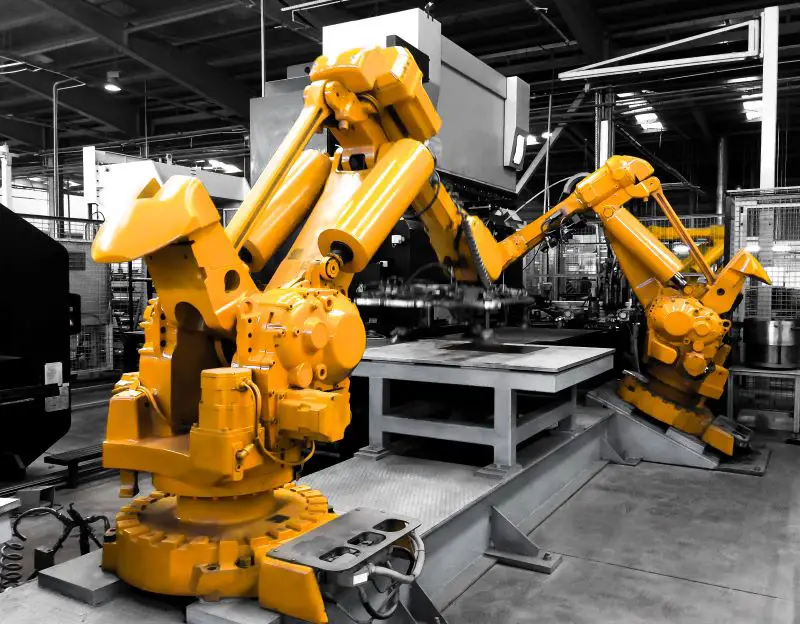Click here to get this post in PDF
This article contains affiliate links. For more info, see disclosure.
With the rapid advancement of technology, automation has become an integral part of modern manufacturing processes. Industrial robots have revolutionized the way products are manufactured, offering improved efficiency, precision, and flexibility. From assembly lines to material handling, robots are transforming the manufacturing industry. In this article, we will explore the top eight robotic applications in manufacturing processes, showcasing the versatility and impact of these machines in various sectors.
A Brief of Types of Industrial Robots
Before delving into the specific applications, let’s start by understanding the different types of industrial robots commonly used in manufacturing. Industrial robots can be classified into several categories based on their design and functionality. These include articulated robots, SCARA robots, delta robots, Cartesian robots, and collaborative robots (cobots). Each type has its unique capabilities, allowing manufacturers to choose the most suitable robot for their specific needs.
1. Assembly and Disassembly
One of the primary applications of industrial robots in manufacturing is assembly and disassembly processes. Robots can perform intricate tasks such as assembling components, fastening screws, and connecting electrical wires with unparalleled precision and speed. These robots can handle repetitive tasks without fatigue, resulting in increased productivity and reduced errors. Furthermore, advanced vision systems enable robots to identify and handle components of varying shapes and sizes, making them highly adaptable to changing production requirements.
2. Material Handling
Efficient material handling is crucial in manufacturing facilities, and robots excel in this application. Industrial robots equipped with robotic arms and grippers can effortlessly lift, move, and sort materials of different sizes and weights. Whether it’s loading and unloading heavy pallets, transferring parts between workstations, or organizing inventory, robots streamline material handling processes, minimizing the risk of injuries and enhancing overall productivity.
3. Welding and Cutting
Welding and cutting processes are traditionally labour-intensive and require skilled operators. However, robots have emerged as game-changers in this field. Welding robots, equipped with precision torches and sensors, can perform high-quality welds consistently, reducing human error and improving the overall efficiency of the welding process. Similarly, robots equipped with plasma cutters or laser cutters can accurately cut materials, ensuring clean and precise cuts every time.
4. Painting and Finishing
The application of paint and finish in manufacturing requires a steady hand and meticulous attention to detail. Robots equipped with paint sprayers or powder coating equipment can deliver consistent and flawless finishes on various surfaces. These robots can follow pre-programmed patterns, adjust paint thickness, and precisely control spray angles, ensuring uniform coating and reducing material waste. The use of robots in painting and finishing not only enhances the quality of the final product but also improves safety by minimizing exposure to hazardous chemicals.
5. Quality Inspection
Maintaining high-quality standards is essential in manufacturing. Industrial robots equipped with advanced sensors and cameras can perform accurate and efficient quality inspections. These robots can examine products for defects, measure dimensions, and identify inconsistencies in real time. By automating the inspection process, manufacturers can identify and rectify issues promptly, ensuring that only flawless products reach the market.
6. Packaging and Palletizing
Robotic automation has revolutionized the packaging and palletizing processes in manufacturing. Robots can handle packaging tasks such as picking, sorting, and placing products into containers with remarkable speed and precision. Additionally, robots excel in palletizing and arranging products on pallets for storage or shipping. By automating these processes, manufacturers can optimize space utilization, reduce labour costs, and improve overall logistics efficiency.
7. Machine Tending
In manufacturing facilities with heavy machinery, machine tending tasks can be physically demanding and pose safety risks to human operators. Industrial robots equipped with specialized end-effectors can perform machine-tending tasks with dexterity and precision. These robots can load and unload raw materials, monitor machine parameters, and perform routine maintenance tasks. By relieving human operators from these tasks, robots enhance workplace safety, increase machine uptime, and improve overall production efficiency.
8. Collaborative Robots (Cobots)
Collaborative robots, or cobots, have emerged as a significant advancement in the field of robotics. These robots are designed to work alongside human operators, enhancing productivity and safety. Cobots are equipped with advanced sensors and safety features that allow them to operate close to humans without the need for safety barriers. They can assist in various manufacturing tasks, including assembly, pick-and-place operations, and quality inspection. Cobots offer the advantage of easy programming and flexibility, making them highly adaptable to changing production needs.
Conclusion
The integration of industrial robots into manufacturing processes has revolutionized the industry, offering increased productivity, precision, and efficiency. From assembly and disassembly to material handling, welding, painting, quality inspection, packaging, machine tending, and the rise of collaborative robots, the applications of robots in manufacturing are vast and diverse. As technology continues to advance, we can expect even greater advancements in robotic automation. Manufacturers that embrace these technological advancements stand to benefit from improved productivity, reduced costs, enhanced product quality, and increased workplace safety. By leveraging the power of industrial robots, businesses can stay competitive in the ever-evolving manufacturing landscape and pave the way for a more efficient and innovative future.
You may also like: How Robotic Systems Are Making Factories More Efficient
Image source: elements.envato.com

